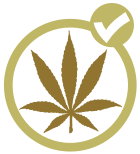- Marijuana Party of Canada
-
Marijuana Party 
Leader Blair Longley Ideology Radical (Cannabis)
Liberal
LibertarianElections Canada 0 House, 0 Senate Website marijuanaparty.ca Politics of Canada
Political parties
ElectionsThe Marijuana Party (French: Parti Marijuana) is a Canadian federal political party. Its agenda consists of ending prohibition of cannabis. With the exception of this one issue, the party does not have "official policy" in any other area. Thus, party candidates are free to express their own personal views on all other political issues even if such views contradict the personal opinions of other party candidates or the party leader. Candidates appear on election ballots with the short-form of the party name "Radical Marijuana." They are in a very similar situation to what independent candidates are in. Radical Marijuana is a "decentralized" party. Although it is governed by the Canada Elections Act, it has no other by-laws, charter or constitution to govern its operations. Its Electoral District Associations are autonomous units of the party as whole. The only material benefit that small registered political parties have is the political contribution tax credit, and Parti Marijuana Party seeks to maximize that opportunity through its Electoral District Associations.
Contents
History
The party was founded by Marc-Boris St-Maurice. On February 28, 2005, St-Maurice announced his intention to join the Liberal Party in order to work for liberalized marijuana laws from within the governing party. A large number of former Marijuana Party members have joined one of the mainstream political parties (Bloc Québécois, NDP, Liberal, Conservative, or Green) in order to push for reform from within.
In 2005, Elections Canada recognized Blair T. Longley as the new party leader following St-Maurice's resignation.
In the November 2000 federal election, the party nominated candidates in 73 ridings in seven provinces and won 66,419 votes (0.52% of national popular vote). In the June 2004 federal election, the party nominated almost the same number of candidates (71), but won only 33,590 votes (0.25% of the national popular vote). In the January 2006 federal election, the party ran candidates in only 23 ridings and received 9,275 votes (0.06% of the national popular vote). In the Nunavut riding, however, the party's candidate won 7.88% of all ballots cast and finished in fourth place, ahead of the Greens.
In January and May 2004, changes were made to Canada's electoral laws which significantly reduced the fund raising abilities of the Marijuana Party; specifically, the elections law was amended so that most of the Marijuana Party's political contribution tax credit scheme was criminalized.[citation needed] The end result of those changes was a significant drop in the party's funding. Since 2004, parties with more than two per cent of the national vote are eligible to receive $2 per year per individual vote, as well as have the majority of their election expenses refunded. Small parties, who are unable to secure two per cent of the vote, such as the Marijuana Party, do not qualify for any subsidy from votes or for election expenses. In 2008, the Supreme Court of Canada upheld this funding requirement.[citation needed] A court ruling made each federal candidate's $1,000 nomination deposit fully refundable. Another court ruling reduced the number of candidates required for official party status from 50 to only 1.[citation needed] Although these rulings have made it possible for the Marijuana Party to survive, the 2004 electoral changes have left the Marijuana Party substantially weaker.
Election results
Election # of candidates nominated # of total votes % of popular vote % in ridings run in 2000 73 66 310 0.516% 1.98% 2004 71 33 497 0.25% 1.02% 2006 23 9 275 0.06% 0.82% 2008 8 2,319 0.02% 1.00% 2011 5 1,756 0.01% 0.69% Provincial parties
In addition to the Bloc Pot party in Quebec, the Marijuana Party has several separate provincial counterparts, most notably, the British Columbia Marijuana Party which received over 3% of the vote in the 2001 provincial election, and the Marijuana Party of Nova Scotia. The Bloc Pot and the federal Marijuana Party work together, however, the BC Marijuana Party and the federal Marijuana Party do not work together.
See also
- Marijuana Party candidates, 2008 Canadian federal election
- Marijuana Party candidates, 2006 Canadian federal election
- Legal issues of cannabis
- Marijuana parties
External links
Federal political parties in Canada House of Commons Senate Other parties recognized
by Elections CanadaAnimal Alliance-Environment Voters · Canadian Action · Christian Heritage · Communist · First Peoples · Libertarian · Marxist–Leninist · Marijuana · Pirate · Progressive Canadian · Rhinoceros · United · Western BlockNotable historical parties Anti-Confederate · Bloc populaire · Canadian Alliance · Conservative (historical) · Co-operative Commonwealth · Labour · Labour-Progressive · New Democracy · Progressive Conservative · Progressive/United Farmers · Ralliement créditiste · Reform · Rhinoceros (historical) · Social Credit · UnionistPortal:Canadian politics · List of political parties · Politics of Canada Categories:- Federal political parties in Canada
- Cannabis political parties
- Cannabis in Canada
- Libertarian parties
Wikimedia Foundation. 2010.
